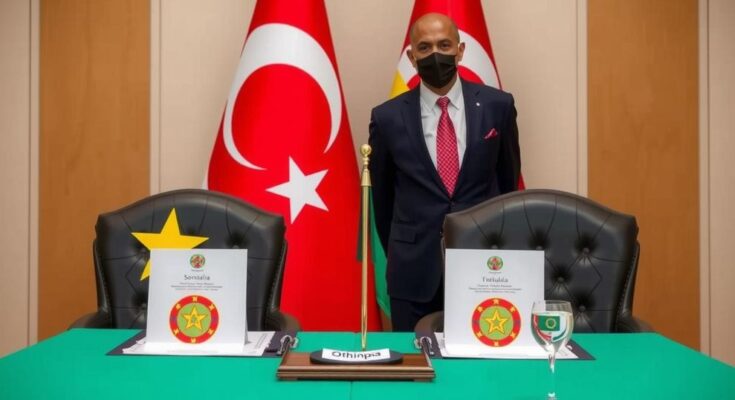Somalia and Ethiopia have restored full diplomatic ties following a significant visit by Somalia’s President, facilitated by Türkiye’s mediation. The two nations aim to overcome previous disputes and enhance cooperation in trade and security. Despite this progress, underlying tensions persist, particularly concerning Ethiopia’s ambitions for maritime access.
A significant diplomatic development has unfolded as Somalia and Ethiopia declared the restoration of full diplomatic relations following a productive visit by Somalia’s President, Hassan Sheikh Mohamud, to Ethiopia. This restoration is crucial in mending a yearlong estrangement that posed a threat to stability in the Horn of Africa. The mediation efforts of Türkiye, which included several rounds of negotiations in Ankara and New York, played a pivotal role in achieving this diplomatic breakthrough in December, garnering approval from the African Union, Washington, and Brussels.
The Ankara Declaration between Ethiopia and Somalia outlines the agreed-upon establishment of technical negotiations, facilitated by Türkiye, set to commence by the end of February 2025 and to be completed within a four-month timeframe. Additionally, both parties committed to setting aside differences and contentious issues in favor of a cooperative approach toward shared prosperity. The mutual decision to restore and enhance bilateral relations was underscored in a joint statement issued by President Mohamud and Ethiopian Prime Minister Abiy Ahmed during the recent meeting.
The historical grievances, particularly Ethiopia’s aspirations for maritime access, have significantly colored relations between the two countries. The diplomatic fallout began last year, when Somalia reacted strongly to Ethiopia’s controversial agreement with Somaliland — its breakaway region — which seemingly recognized Somaliland’s independence in exchange for a strategic port and military base. Subsequently, Ethiopia’s ambassador to Mogadishu was expelled, severing diplomatic ties.
During President Mohamud’s visit to Addis Ababa, both leaders emphasized their dedication to fostering a spirit of friendship and solidarity, discussing enhancements in trade and security collaboration to counter extremist militant threats in the region. Although President Recep Tayyip Erdoğan alluded to prospects for Ethiopian access to the sea, the specifics of such access remain unclear, along with the fate of Ethiopia’s agreement with Somaliland.
Amid these developments, regional tensions continue to simmer, as evidenced by recent meetings among Somalia, Egypt, and Eritrea, where they expressed their collective opposition to Ethiopia’s ambitions. Egypt’s Foreign Minister, Badr Abdelatty, stated that “the Red Sea and its security is subject only to the will of the countries on its coast,” reflecting shared concerns over external military influences in the region. Additionally, Egyptian military forces have recently integrated into the African Union Support and Stabilisation Mission in Somalia, underscoring increasing military cooperation in addressing mutual security challenges.
The diplomatic relations between Somalia and Ethiopia have long been fraught with tensions, primarily stemming from Ethiopia’s geographic need for access to maritime resources and the complex dynamics within the Horn of Africa. Somalia’s outrage over Ethiopia’s agreement with Somaliland, which sought to grant recognition to the breakaway region in exchange for military and port access, escalated tensions between the two countries. Türkiye’s diplomatic mediation has emerged as a key factor in facilitating dialogue and preventing further instability in the region, reflecting broader interests from external parties like the African Union and Western nations to stabilize the Horn of Africa.
In summary, the restoration of diplomatic relations between Somalia and Ethiopia marks a significant step towards healing past grievances and fostering regional stability. The engagement facilitated by Türkiye underscores the importance of mediation in resolving complex inter-state relations in the Horn of Africa. However, lingering concerns regarding Ethiopia’s maritime ambitions and its agreements with Somaliland suggest that achieving long-term peace and cooperation will require sustained efforts from all parties involved, along with regional allies.
Original Source: www.dailysabah.com




